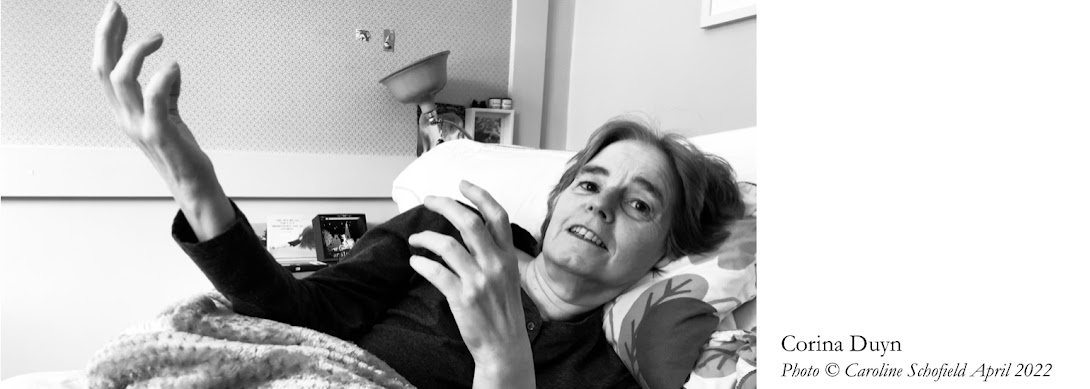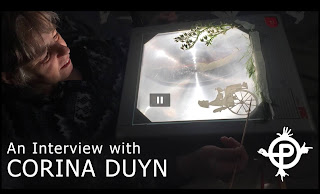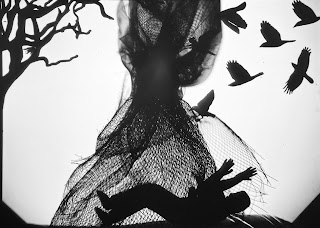As my explorations into all things shadow puppetry and silhouette art continues, I asked Emma Windsor (from Puppet place, who created the amazing podcast from our conversation about ‘Invisible Octopus’) if she would have any information on making a light-box for use in animation.
The obvious first choice is the art of Lotte Reiniger. My question led us both on an exciting creative journey of discovery. To make sure this research won’t go to ‘waste’, here are the links and Emma’s thoughts behind it.
Thanks Emma!
 |
| Lotte Reiniger animating two cut-out figures Credit: BFI National Archive See great article |
All following text is by Emma Windsor, forwarded to me by messenger.
Looking into shadow animation is really interesting as it could be considered as a window into the history of the moving image itself! Grand statement to make I know, but shadow puppet animation is perhaps the oldest forms of moving image. Shadow puppet theatre likely originated in Central Asia-China or in India in the 1st millennium BCE, and could be considered a direct prelude to cinema due to use of light and projection to create images, alongside live music, dialogue from the puppeteers and of course a gripping storyline. However, it wasn’t until the advent of film in the early twentieth century that shadow animation as we understand it today was born.
One of the earliest and best known pioneering artist in shadow animation is Lotte Reiniger, who began making stop motion shadow cut out films in 1918, and whose works continue to delight audiences and influence artists. Notable artists have also experimented with related techniques such as sand-on-glass, or have taken cut-out animation to extraordinary places by pushing the boundaries of the available technology or just being rather, well, silly. Today, cut-out continues to be used both traditionally and digitally –with digital cut-out being one of the most widespread techniques in creating animation in the industry.
Shadow animation over lightbox
I have a look for videos that might be helpful with regards to shadow animation over lightbox. There's not a great deal specifically on that topic, as you say, which is surprising in some respects, but here are a few links that might be useful/interesting:
- The Art of Lotte Reiniger Documentary: This was the first thing that sprung to mind when you asked about shadow work as she is probably the most well known artist in this field, and was an incredibly skilled practitioner. You may have already seen this, but if not then it's a real gem of a documentary. There are clips on YouTube, but I have found the full length version on Dailymotion. Her use of her best dinning table made me smile a lot!
- Excerpt from a Masterclass with Caroline Leaf: Not paper cut-out, but same principle working with sand on glass. Caroline Leaf is another female role model for me, working in paint & sand on glass, and also experimenting with scratching directly onto film stock. I found this interesting as you can watch her process as she's doing it.
- I then thought it terms of process, that looking at cut-out animation in general might be useful, as even though it's not shadow based work, the basic process is of course the same. First artist that sprang to mind is Yuri Norstein, in particular 'The Hedgehog & The Fog' (1975) which is an incredible film technically and has a number of silhouette (or near silhouette) sequences in it.
- There's another masterclass on YouTube with Norstein demonstrating some of the techniques. I haven't watched all of that yet (and it is quite long, plus he's working through a translator but it is v. interesting).
- Then I thought about a short documentary I'd seen with a young Terry Gilliam, which is good fun to watch. I think what I appreciate about Gilliam's early work - other than the visual surrealism) is his approach to movement. Quite basic sometimes, but I think that adds to the humour. I also appreciate his willingness to use what's around him.
- I did a quick bit of research to see if there were any resources on paper cut out and found the following, which might be useful as a starting point to look at other practitioners in cut out:
- Found this and liked it: https://vimeo.com/26383672
- Then this article from NFBC: Norman McLaren and Evelyn Lambart well worth diving into I think...
- Plus the wikipedia page has a good list of artists
- And (finally) I came across this short from a contemporary paper based animator who I didn't know about before, Brandon Ray, which I thought might be useful as he talks about his set-up with rostrum and multiplane about halfway through








